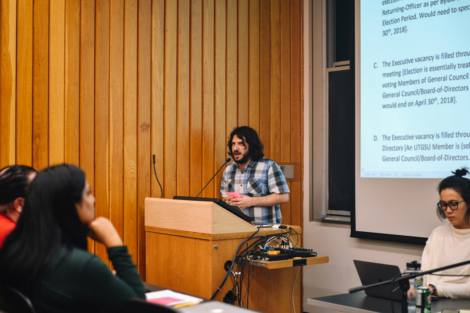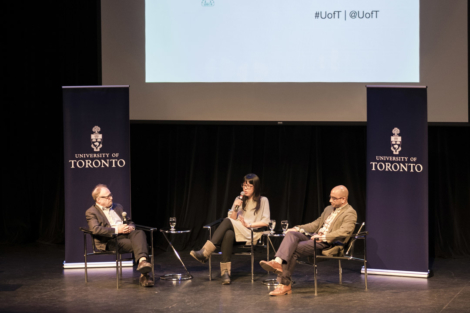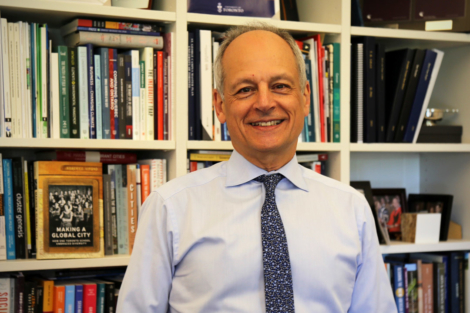Comment contributors discuss: student unions’ attempt to shut out student media outlets like The Varsity; the federated colleges’ response to U of T’s smoking ban; the Graduate Students’ Union (GSU) General Council’s ousting of its Internal Commissioner; the New York Times’ Art of the Book Review panel at U of T; and the firing of U of T President Meric Gertler from the board of Waterfront Toronto.
Obstructing the press serves to delegitimize student unions
Re: “Canadian Association of Journalists rebukes student unions’ attempt to manipulate media coverage”
It’s heartening that the Canadian Association of Journalists (CAJ) has taken efforts to defend the freedom of the U of T student press, including The Varsity and The Underground.
The general situation, however, is a dismal one, as representatives from multiple student unions have attempted to limit the press’ ability to inform students about how they are being governed. While the representatives may believe these Trump-esque practices benefit short-term policy aims, they are actually extremely detrimental, maybe even self-destructive, to student unions and advocacy.
If the student press is unable to write about student union developments by being barred from meetings, student readers will be less informed about decisions affecting them. Over time, they will likely view student unions as merely corporations providing services, instead of democratic organizations that contribute student perspectives to education policymaking.
CAJ President Karyn Pugliese took a stance on a student union’s purpose by describing U of T student unions as “governments,” as opposed to non-profit corporations.
If student unions are microcosms of society, the student government versus student corporation debate illuminates their unique political spectrum. On the right, there are those who prefer corporate structures, not unlike the university administration that used to dominate student affairs. Those on the left view student unions as democratic governments that need to overcome the constraints of current corporate legislation.
The attempts to exclude the press are likely from the corporatist end of this spectrum. However, some may situate themselves on the left in conventional politics in an ironic reversal that would be a textbook case of bad prefigurative politics — in other words, the means not justifying the ends.
Student unions are not merely corporations that provide services. Saying that “student media have been abusing their positions as disseminators and aggregators of information” is synonymous with calling them fake news. Obstructing the dissemination of political knowledge makes it harder for students, especially marginalized students, to participate in politics. This won’t help voter turnout and definitely won’t inspire students to mobilize behind their union when collective action is needed. At that point, the very purpose of a student union would become questionable.
If student representatives think the press’ reporting is inaccurate, perhaps they should establish a better dialogue with student journalists instead of shutting them out.
Justin Patrick is a first-year master’s student in Political Science. He is a University of Toronto Graduate Students’ Union Council Representative for Political Science.
Balancing the smoking ban
Re: “Proposed smoking ban will not affect federated colleges”

Student vaping. Jenna Liao/THE VARSITY
The university has finally implemented its decision to ban smoking as of January 1. While the policy does not apply to the federated colleges, it seems to be only a matter of time before they follow suit with their own policies. Personally, like many others, I do not enjoy walking through clouds of smoke to get to my destinations on campus.
However, I agree with Victoria University Students’ Administrative Council’s plan, as it looks to have smoking areas on its campus. Understandably, many students smoke to cope with stress and anxiety, and it seems unfair and unrealistic to institute a ban across the entire campus. Indeed, it will be almost impossible to enforce.
The University of St. Michael’s College is taking a more public approach and is currently going through consultation and creating a public survey. On an issue that concerns such a personal life habit, it is crucial to hear and take into account the voices of the entire faculty and student population.
It is important for the smoking ban to take into account and balance students’ health and cultural practices. For instance, the policy still allows for ceremonial and medicinal uses. Nonetheless, the ban is justified given that smoking is addictive and linked to numerous health issues. New research has suggested that tobacco smoking causes over 45,000 deaths each year in Canada.
While I do recognize that smoking is an individual choice and is legal in Canada, it is a source of pollution that harms our air and environment. As institutions independent of the university, including federated colleges, look to develop their own policy, it is crucial to respect students’ autonomy to do what they want while considering how their activity imposes on others.
Gabrielle Cotton is a fourth-year Equity Studies, Political Science, and Urban Studies student at Woodsworth College.
Conspiracy or not, leadership means taking action
Re: “Internal Commissioner pushed out by Graduate Students’ Union General Council”

Branden Rizzuto, the GSU’s Finance Commissioner, moved the motion to vacate the Internal Commissioner position. ANDY TAKAGI/THE VARSITY
As the drama within the University of Toronto Graduate Students’ Union (UTGSU) General Council unfolded last month, one thing was certain: the council has had rough team dynamics throughout ex-Internal Commissioner Lynne Alexandrova’s tenure. While it may be difficult to see the truth objectively in this very much he said, she said battle, a broader perspective makes it easier to see the landscape on which the battle was cultivated.
The UTGSU’s executive committee seems to have differing views about and plans for its Internal Commissioner, and has apparently been cultivating a movement against her for some time before proposing her exit, citing a violation of Article 9.1 of the UTSGU bylaws. Much like an impeachment, most of the discussion and plotting happened out of the public eye, which would explain Alexandrova’s confusion and lack of strength to “stand up to ungrounded anxieties causing confrontational measures.”
However, it also appears that her claims that the executive committee had not given her sufficient warnings are not well supported. The committee had warned her in October, yet she failed to circulate a report against the allegations, or at least submit a viable argument. Alexandrova said that, had she been at the meeting, she could have prevented the committee from invoking Article 9. She blamed the culture of the union, which she claimed favoured returning executives over outside perspectives, underlining a conspiracy to vacate her from her position.
The overall issue however, with or without a conspiracy, is that Alexandrova seems to have not been as active in the union’s meetings and activities as she should have been. Despite the somewhat shady politics and longtime internal problems and misunderstandings, she should not make excuses for why she was ousted from her position. If there is cause for concern against one’s leadership, one must not wait for a formal warning. Rather, one must jump into action to rectify the situation.
Varsha Pillai is a first-year Social Science student at University College.
Forget reviews — go to the source
Re: “The New York Times hosts Art of the Book Review panel at U of T”

“There’s news value in these books,” NYT’s nonfiction book critic Jennifer Szalai said. THEO ARBEZ/THE VARSITY
While the panel suggested that book reviews should be artfully intertwined with news value and the broader world surrounding the work, I think of the book critic’s vocation in this framework instead.
It’s rather disturbing how book critics get away with publishing emotionally charged critiques. This weakens their cause and ability to produce a valid and objective analysis. Furthermore, the news value is often irrelevant and undermines the public trust and credibility of media.
Book reviews are a centuries-old persuasion architecture rife with hidden agendas. Undisclosed but fermenting personal motivations, financial interests, and professional relationships have left a rancid aftertaste.
The book reviewing vocation is coming to an end as yet another casualty of the information age.
Today, opinions of book reviewers like those found in the New York Times are as, if not less, consequential to those of Amazon’s verified purchasers. Reviews shouldn’t inform you before you’ve acquainted yourself with the work firsthand.
A truly endearing and distinguished U of T alum, Josh Hough, who it deeply pains me to say tragically passed away recently, taught me to remember that nothing can take the place of one’s firsthand study of the work itself — and to cherish and treasure the great primary sources. For example, Charles Darwin’s The Origins.
Imagine formulating an opinion on the music of Bob Marley or John Lennon, not through listening to the artist, but from a secondary source like a review. What kind of experience and quality of opinion would that be? Now, it’s true that a song may take only three minutes to hear and a book takes much longer to read. Still, it’s better to forgo one’s urge to read a book review before reading the book itself.
Go to the source and don’t let others meddle in between. The pleasure of a book comes through reading the book and not someone else’s reaction.
Oscar Starschild is a second-year Mathematics, Philosophy, and Computer Science student at Woodsworth College.
Gertler is a true Varsity Blue
Re: “Meric Gertler fired from Waterfront Toronto board of directors amid Google deal”

SHANNA HUNTER/THE VARSITY
Every Varsity Blue knows the feeling: during enrolment, you’re scouring classes and you find one you know you’ll crush. You prepare, do research, go to lecture, finish the readings, work hard — and then get blindsided by an errant bell curve or bloodthirsty teaching assistant (TA). Forces larger than you sail and zip and thrash around, and you end up getting slapped with a subpar grade — a blemish on an otherwise respectable transcript.
Four weeks ago, an ambitious, hardworking Varsity Blue walked into this very trap. After a big welcome and high praise, U of T President Meric Gertler was laid off from the Waterfront Toronto board, two years after being appointed.
Letting go of Gertler was a mistake — he is vastly overqualified for the position. He has ogles of degrees, decades of experience, and has been hailed as one of Canada’s foremost thinkers in urban design. His departure has more to do with partisan politics than rational decision making. It was foolish to let him go and the province, in its search for scapegoats, is shooting itself in the foot by doing so.
Gertler’s situation isn’t a novel one. Whether it be a bloodthirsty TA or an insecure, impulsive government, we’re often beholden to the questionable opinions of others. But failing a class, getting booted off a board — these aren’t calamities or revelations of character, but opportunities for growth and self-reflection.
President Gertler has been respectful through the ordeal and has set an example for the 90,000 other ambitious, hardworking — and occasionally unfortunate — Varsity Blues around him.
Ted Fraser is a third-year International Relations student at Victoria College.


